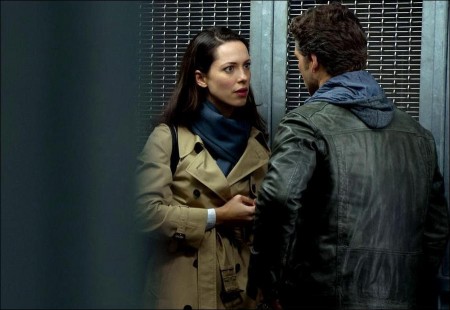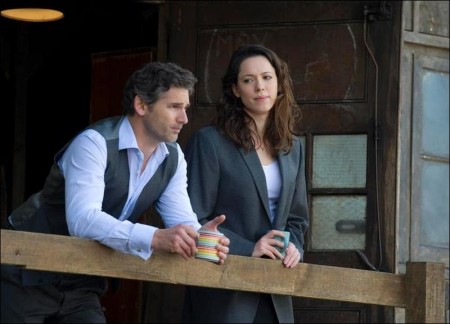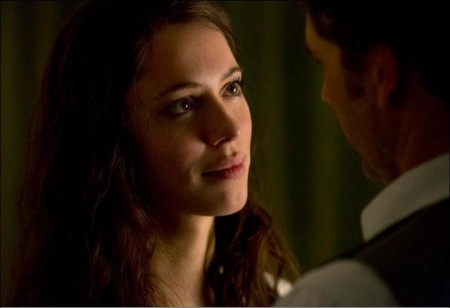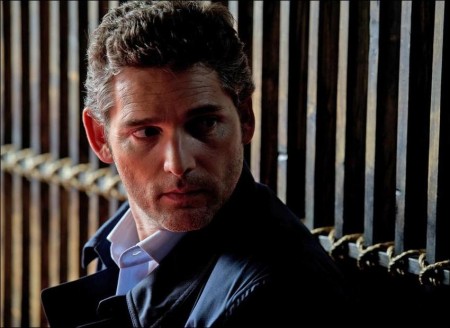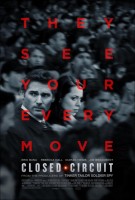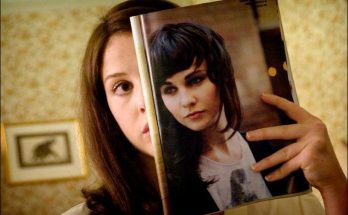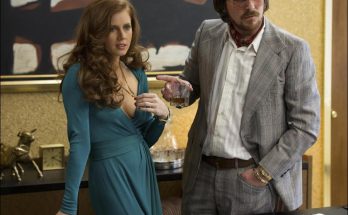Taglines: They see your every move.
In the international suspense thriller Closed Circuit, a high-profile terrorism case unexpectedly binds together two ex-lovers (Eric Bana and Rebecca Hall) on the defense team – testing the limits of their loyalties and placing their lives in jeopardy.
One morning, a busy London market is decimated by an explosion. In the manhunt that follows, only one member of the suspected terrorist cell survives: Farroukh Erdogan (Denis Moschitto), who is arrested and jailed. Preparations begin for what promises to be the trial of the century.
But there’s a hitch: the government will use classified evidence to prosecute Erdogan, evidence so secret that neither he nor his lawyers can be allowed to see it. Hence the need for the Attorney General (Academy Award winner Jim Broadbent) to appoint a Special Advocate, an additional government-approved defense lawyer (Claudia Simmons-Howe, played by Golden Globe Award nominee Rebecca Hall), one who has clearance to see classified evidence and who can argue for its full disclosure when the trial moves to “closed” session. The rules for the Special Advocate are clear: once the secret evidence is shared with her, Claudia will not be allowed to communicate even with the defendant or with other members of the defense team.
But just as the case is on the eve of going to trial, Erdogan’s lawyer dies suddenly, and a new defense attorney, Martin Rose (Eric Bana), quickly steps in. Martin is tenacious, driven, brilliant – and an ex-lover of Claudia’s. The two lawyers make an uncomfortable pact to keep their former affair hidden. But as Martin begins to piece the case together, the outlines of a sinister conspiracy emerge, one that will draw him and Claudia dangerously close again.
About the Production (2013)
Making Closed Circuit, a thriller rooted in the world of today, required knowledge and expertise not only about filmmaking but also about an idiosyncratic criminal justice system.
Working Title Films principals Tim Bevan and Eric Fellner had produced a number of successful contemporary thrillers, including The Interpreter. Since 9/11 in the U.S. and 7/7 in the U.K., Bevan found himself aware of how “the U.K.’s criminal justice system has changed enormously. This was something I had been discussing with my barrister friend Tim Owen, QC [Queen’s Counsel]. Over the years, he has worked on fascinating criminal cases and I had mentioned doing a dramatic film in that setting. It’s an arena not often explored on the big screen. Defence of the Realm, from 1986, was a film I had in mind as precursor because it is about a conspiracy inside the corridors of British power.
“I gravitated towards exploring what would happen today in a highest-priority terrorism case within the context of the British legal system. The ins and outs of its courts are actually quite cinematic; as Tim pointed out, not all legal work takes place in court. Deals get cut in offices ‘behind the scenes,’ and the outside world doesn’t really know about it.”
Bevan contacted another filmmaker well-known for acclaimed contemporary thrillers: Eastern Promises and Dirty Pretty Things screenwriter Steve Knight. Bevan says, “I knew that Steve would be able to impart relatable characters into a compelling story while remaining in the realm of believability.”
The screenwriter was eager to collaborate with Working Title on the idea. After conferring with Bevan and Owen, Knight began to hone his original screenplay around a U.K. terrorism trial’s defendant’s legal representation — a barrister and a Special Advocate (SA).
Bevan remarks, “When the trial gets going, each is not allowed to know what the other one is doing; they’re ‘the defense team’ and yet they cannot coordinate efforts. The evolution of the SA has been significant for the legal system.”
Knight elaborates, “This was a change in the law for particularly sensitive, and usually terrorist-related, cases. In such cases, the defense barrister and the SA are not allowed to interact or even speak outside of court. This is to prevent secret evidence that the SA is given from being socially passed on to the defense barrister — whether accidental or not. The person being tried, the defendant, will never have all the facts in front of him.
“I thought that if the defense barrister and the SA were a man and a woman who had a personal history that wasn’t known to the world, this was ripe for a thriller treatment. There would be overlap among the legal profession, the workings of Parliament and of government forces, and human beings working at relationships.”
Knight clarifies, “Closed Circuit is a story of skullduggery and things gone wrong. I do feel that the British judicial system is in pretty good shape, but it needs to be examined every now and again. In writing this screenplay, I spoke to many people in the legal profession who care that it be just and right. I hope this comes across in our movie.
The screenwriter’s research included attending trials, during which he closely observed “people in pressure-cooker situations: someone facing 20 years in prison, for instance.”
Work on the script continued over a two-year period. In 2011, producer Chris Clark, who had started his career at Working Title, joined the project. Clark had been with the company back when the idea took shape, and “Tim Bevan mentioned that there was now a script and showed it to me. It had a very modern take on paranoia, as there is a lot of fear in society today including at the government level. I loved how, as the story progresses, the romance aspect complicates things in an unusual way. I thought Steve Knight had taken the original idea of a contemporary legal thriller and ran with it.”
Knight admits that he found “the world of the legal profession to be particularly fascinating to write about because it is enclosed; this is not only in that you have a set of buildings, the Inns of Court, but also archaic traditions and methods of dress.
“In writing scripts, especially London stories, I try to find paths that haven’t been trodden particularly heavily in movies before. Usually these are right under your nose, and as a writer you have to identify them and then try to tell the story.”
Clark adds, “What Steve is brilliant at in his scripts like Dirty Pretty Things and Eastern Promises is taking you into different parts of London, parts we may think we know something about but which we don’t. He layers in complexities yet always makes the story entertaining.”
John Crowley was approached to direct. “We were very keen to work with John, and had developed projects with him in the past,” notes Bevan. “In the films he had directed, he was able to conjure up a lot of tension in unexpected moments. That’s what we were looking for a director to bring to Closed Circuit; we wanted the audience’s comfort to be challenged over the course of the movie, as a sense of unease seeps in and the heartbeat rate goes up.
“John is also well-known for his stage work, which shows his strength in eliciting subtlety from actors — something that was absolutely appropriate for our movie.”
Clark agreed: “I could see John directing our movie because of how he is able to tap into — and how he is able to get actors to tap into — psychological aspects of the characters. He always elicits truthful performances.”
“John has a European sensibility,” assesses Knight. “He and I spoke about structure, and I was able to make changes so the script worked better and it was ready for filming.”
Crowley remarks, “When I first heard about the project from Working Title, my ears pricked up. I’m a fan of Steve’s screenwriting. Thrillers are perhaps my favorite genre of film, and to do an intelligent web-of-conspiracy tale in a London setting felt like fresh territory. I wanted to try to make the film with degrees of authenticity in both location and story.
“I have always been curious about the law because it feels drenched in ritual and in a codified language. Of course, a lot of people in the legal world work hard to try and de-mystify it. Yet its structure remains a source of fascination.”
The director committed to the feature not least because he feels that “there are a lot of people who feel very strongly that there are dangers to having closed court hearings, and that these fly in the face of due process. If you cannot have revealed, in open court, the evidence that someone has against you and have it tested, are you suspending something which is central to a fair legal system?”
Closed Circuit (2013)
Directed by: John Crowley
Starring: Eric Bana, Rebecca Hall, Ciårán Hinds, Riz Ahmed, Anne-Marie Duff, Kenneth Cranham, Denis Moschitto, Julia Stiles, Jim Broadbent
Screenplay by: Steven Knight
Production Design by: Jim Clay
Cinematography by: Adriano Goldman
Film Editing by: Lucia Zucchetti
Costume Design by: Natalie Ward
Art Direction by: Matthew Gray, Dominic Masters
Music by: Joby Talbot
MPAA Rating: R for language and brief violence.
Studio: Focus Features
Release Date: August 28, 2013
Visits: 44
